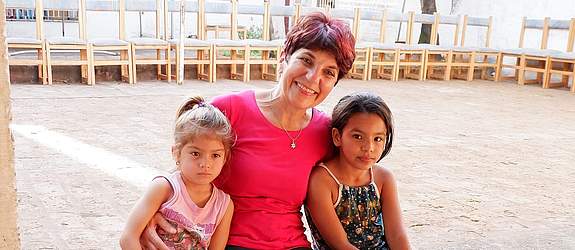Friends Edtion: You moved to Paraguay last year to lead our project there. What has changed for you through this change?
Ruth: After more than twenty years of supporting our international projects from our German office, I am now right in the middle of the action. The profile of my work has changed considerably. I do less at the desk, but work with children again, constantly getting to know new people, building friendships with the people here. Besides language and culture, what is new is that I live here in the Transformation House with a team and people from Paraguay. I see a great benefit in this; because this way I can really get to know them and their culture and understand how they think.
FE: You gave up everything in Germany, because Paraguay "grabbed" you. How did this happen?
Ruth: That was when I flew to Asunción in 2018 to coordinate the restructuring of our project here. Actually it was only supposed to be a stay of several weeks. But in that time something happened to me that made me want to move to Paraguay. It was as if an arrow had pierced my heart. Afterwards I had the thought for the first time: "What if I could stay here for a long time to share my life with the people?
FE: Were there certain key situations for your decision?
Ruth: Yes, there were. A defining moment in my stay in 2018 was the encounter with a teenager who lived on the street. As a Christian, I told him about the biblical story of the prodigal son, in which the father rejoices exuberantly that his child is returning home to him. The teenager replied, "What? The father was actually happy that the son came back?!" What shook me at that moment was how he could possibly think that God or anyone else had so little interest in him. I was also overwhelmed by the boundless joy with which the children enjoyed the children's program with games, music and a small meal.
FE: With you, a new team started work in our Transformation House in Asunción. Looking back, can you already see the first effects?
Ruth: Yes; the lives of children who don't know what value they actually have changed. The wide range of activities for both children and families is being used a lot. Since March, we have been distributing food packages to up to 900 families per week, as they had nothing to eat due to the COVID-19 pandemic. The time and help we invest may not always be measurable in countable results, but they do change. At home, most of the children are either ignored or in some cases even beaten, sometimes have nothing to eat and do not receive any support at school. In the Transformation House, we took in some young adults to live with us who have stabilized considerably since then. We can show them day by day in their everyday life that they have a huge value and a future. Here many people have the attitude to life: "It has never worked before; why should it work now?". Our goal is to convey to people that there is a meaning to their lives and they realize: "I have potential. What I am and what I have is important for this country, or with that I can make a difference in my family". This is what we actually convey permanently, also with everything we do practically.
FE: So would you say it was worth it?
Ruth: It was absolutely worth it. Despite all the challenges, I know that I am in the right place at exactly the right time. I have always done my work with the conviction that what we do really changes people's lives. Being here now has brought this vision to life once again in a whole new way. It is important to me to say that supporters of this work are not just doing something good. Your help is invaluable. To improve life week after week in everyday life is so incredibly precious.
FE: Thank you very much for the interview
The interview was conducted by Annegret Cornehl
